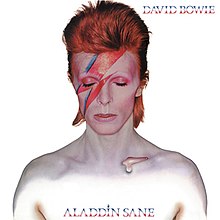Aladdin Sane
| Aladdin Sane | ||||
|---|---|---|---|---|
 |
||||
| Studio album by David Bowie | ||||
| Released | 13 April 1973 | |||
| Recorded | 6 October 1972, 4–11 December 1972, c. 18–24 January 1973 | |||
| Studio | Trident Studios, London and RCA Studios, New York and Nashville | |||
| Genre | ||||
| Length | 40:47 | |||
| Label | RCA | |||
| Producer |
|
|||
| David Bowie chronology | ||||
|
||||
| Singles from Aladdin Sane | ||||
|
||||
| Professional ratings | |
|---|---|
| Review scores | |
| Source | Rating |
| AllMusic | |
| Blender | |
| Chicago Tribune | |
| Christgau's Record Guide | B+ |
| Encyclopedia of Popular Music | |
| Mojo | |
| Pitchfork Media | 9.0/10 |
| Q | |
| Rolling Stone | |
| The Rolling Stone Album Guide | |
Aladdin Sane is the sixth studio album by English musician David Bowie, released by RCA Records on 13 April 1973. The follow-up to his breakthrough The Rise and Fall of Ziggy Stardust and the Spiders from Mars, it was the first album he wrote and released from a position of stardom.
NME editors Roy Carr and Charles Shaar Murray called the album "oddly unsatisfying, considerably less than the sum of the parts", while Bowie encyclopedist Nicholas Pegg describes it as "one of the most urgent, compelling and essential" of his releases. The Rolling Stone Magazine review by Ben Gerson pronounced it "less manic than The Man Who Sold The World, and less intimate than Hunky Dory, with none of its attacks of self-doubt."
In 2003, the album was ranked among six Bowie entries on Rolling Stone Magazine's list of the 500 greatest albums of all time (at #277) and was later ranked No. 77 on Pitchfork Media's list of the top 100 albums of the 1970s.
The name of the album is a pun on "A Lad Insane". An early variation was "Love Aladdin Vein", which David Bowie dropped partly because of its drug connotations. Although technically a new Bowie 'character', Aladdin Sane was essentially a development of Ziggy Stardust in his appearance and persona, as evidenced on the cover by Brian Duffy and in Bowie's live performances throughout 1973 that culminated in Ziggy's 'retirement' at the Hammersmith Odeon in July that year. Lacking the thematic flow found on its predecessor,Aladdin Sane was described by Bowie himself as simply "Ziggy goes to America"; most of the tracks were observations he composed on the road during his 1972 US tour, which accounted for the place names following each song title on the original record labels. Biographer Christopher Sandford believed the album showed that Bowie "was simultaneously appalled and fixated by America".
...
Wikipedia
